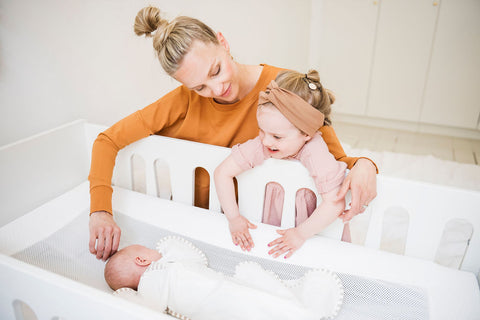When your baby doesn’t sleep through the night or wake up early, the parents usually concentrate on the naps. Do we sleep the night-time sleeps away during the day? How much sleep does my baby need each day? Many parents can be surprised that also too short naps may cause short night-time sleep or the night wakings.
The baby’s age and the need for sleep are the basis for a suitable sleep schedule. Newborns don’t have a circadian rhythm and they usually sleep almost through the whole day. Already at the age of few months you can support the nighttime sleep with timing the daytime sleep right. The right routine is found usually at the age of six months. Sleep training can be helpful too!
Here are some good tips for creating a daytime nap schedule that helps to regulate the nighttime sleeps!
Baby sleep: Waking up regularly every morning
If your baby doesn’t wake up at almost the same time every morning, it can be hard to regulate the naps or understand the cause for sleep problems. If your baby sleeps too long in the morning, your baby won’t be tired in the evenings and will fall asleep later.
Waking up regularly can be easier said than done: for once the baby sleeps long, it can be tempting for the parent to sleep long as well. Usually following the regular wake-up routine pays itself back fast in better night-time sleeps.
Newborns need sleep in every 2-4 hours
There are many different instructions for timing the baby’s naps during the day, so it can be hard to choose the right routine for you. Especially, because the rhythm is also affected by the age of the child and the individual needs. The younger the baby is, the shorter time she/he can be awake and be in a good mood.
A rule of a thumb is that the time between waking up in the morning and the first nap of the day should the shortest one. And the longest time should be between the last nap and the night-time sleep. The first naps should be a couple of hours after waking up. At the age of six months the time between the last nap in the evening and the night-time sleep should be approximately four hours, in order that falling asleep wouldn’t be hard.
You can regulate the length of the baby's naps!
You should wake your newborn to eat in every three hours, so your baby’s longest sleeps are little by little at night. At the age of six months the baby’s sleep-wake cycle has started to develop so your infant doesn’t need naps longer than two hours anymore. Whether the naps are longer than two hours, falling asleep can be hard in the following days.
When the child is having three naps in a day, the shortest one should be the last nap of the day. Usually sleeping 30-45 minutes is enough to keep the six-month-old baby in a good mood until it is time for night-time sleep. At the age of 9 months, you can usually leave those last naps out from your infant’s daytime nap schedule.
If your baby seems to be over-tired or needs to have more naps, you should rather let him/her sleep more often and keep the naps shorter than let your baby sleep longer in every nap.
Variation between the brightness and darkness helps to regulate the daily rhythm
Specially in Finland, the babies who are born in winter, can have problems finding the right sleep-wake rhythm. The dark days are tempting reason to have longer naps and that can cause that the longest “wake-time” zone is in the evening or at night.
The antidote to this is to keep the sleeping space light when your baby is having naps. Also, there is no need to be quiet. A pitch-black room and silence should only occur at night time.
Being over-tired messes up the quality and length of the baby sleep
A small baby has so called “sleep windows” when it is easier and natural to fall asleep. Timing the sleep during these sleep windows will help both to create a daily rhythm and to prevent restlessness.
Bustling babies can show signs of tiredness only for a short time and if the parent won't grab the chance, the baby will be active again! Restlessness can have an effect for sleeping by making it an actual struggle and waking the baby up earlier in the following days.
If you hope for better and longer sleeps, don’t keep the baby up! Let the little one sleep, when he/she starts to yawn, rub eyes or whine. If those things happen already for example during the evening snack, do the evening routines earlier. The prize of it can be longer sleeps for the whole family!
Enough sleep equals a happy baby
Sleeping enough during the day or at night will make your infant happy and falling asleep is easier. Learning the signs of tiredness and creating a regular daily rhythm for your baby, helps you to estimate how much sleep does your baby need. Whining, reddening eyelids and the lack of concentration and observation are a message from Sandman: More sleep is needed!
Good luck with sleep training!
Sanna.K
The writer is a biologist, who is continually searching for better sleep! She has a baby who didn’t used to sleep well.





Leave a comment: